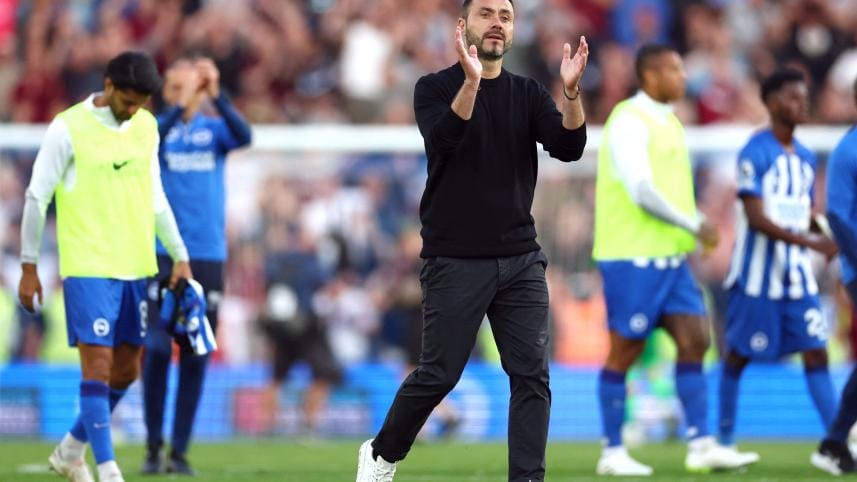From exile to Europa League

Brighton's "incredible" journey from homeless exiles facing oblivion to their current status as Premier League trendsetters will reach a memorable climax when they host AEK Athens in their first-ever European match on Thursday.
For a generation of Brighton fans, AEK's visit to the Amex Stadium in the Europa League group stage is the kind of occasion that would have been unthinkable in the dark days, when the club appeared set to implode.
Once as decrepit as the fire-ruined West Pier on the south-coast city's pebble beach, Brighton, under coach Roberto De Zerbi, now possess one of the most admired business models in world football.
Clubs seek to emulate Brighton's ability to scour the globe for obscure youngsters such as Moises Caicedo, Alexis Mac Allister and Marc Cucurella, all developed into assets that commanded huge transfer fees in relation to their initial cost.
The innovative formula helped the Seagulls defy the odds with a sixth-place finish in the Premier League last season.
They have made another a strong start this term, including Saturday's 3-1 embarrassment of Manchester United at Old Trafford.
"This has been an incredible project. There is definitely a broader awareness of Brighton now," said Albion chief executive Paul Barber.
"One European club I spoke to takes a feed of all our games, and their coaching staff sit down on Monday mornings and watch them from start to finish."
It is an unprecedented position of strength for a club that 26 years ago came within a whisker of crashing out of the English Football League and did not have a stadium of their own.
When Steve Gritt was hired as Brighton manager in December 1996 the team were languishing 11 points adrift at the bottom of the fourth tier, with a catastrophic relegation to non-league football looming.
They achieved the point they needed to survive but despite their great escape, Brighton's problems were only just beginning.
The Goldstone Ground, Brighton's stadium for 95 years, was sold for property development in 1997.
Brighton were cast into exile, forced to endure a 150-mile round trip by road for every 'home' fixture as they ground-shared at Gillingham's Priestfield Stadium.
Attendances dropped as low as 1,025 during Brighton's two seasons there and it seemed the club might not survive the wilderness years.
Crucially, in 1999, the club secured a lease to play at the Withdean Stadium, a converted athletics stadium two miles north of the city centre.
With a limited capacity and little covered seating, Withdean was hardly a glamourous setting, but the emotion generated by Brighton's return home allowed the club to rediscover its sense of self.
Professional poker player Tony Bloom bought the club in 2009, betting that a purpose-built new stadium, which opened two years later on the city's outskirts, would fast-track the team's revival.
The gamble paid off handsomely and, after a 34-year absence, Brighton were promoted to the Premier League in 2017.



 For all latest news, follow The Daily Star's Google News channel.
For all latest news, follow The Daily Star's Google News channel.
Comments